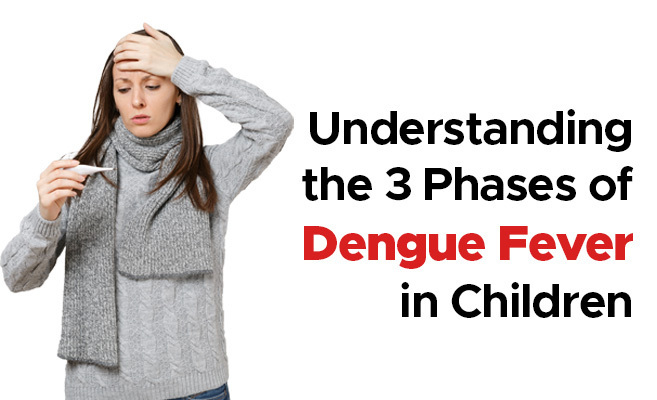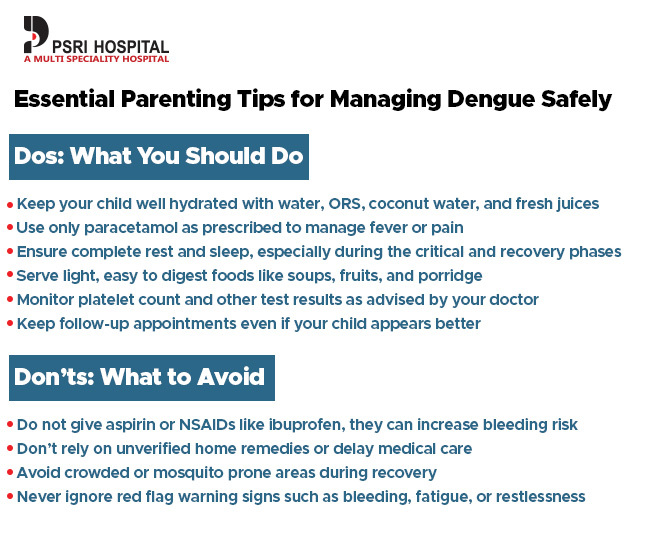Understanding the 3 Phases of Dengue: A Parent’s Essential Guide

Every monsoon, hospitals across India report a sharp increase in dengue fever cases and children are among the most vulnerable. As a parent, it can be overwhelming to see your child suffer from high fever, body aches, or sudden fatigue without understanding how serious it may become. At PSRI Hospital, a trusted multispeciality hospital in New Delhi, we know that early recognition of the 3 phases of dengue fever can lead to better outcomes and fewer complications.
Dengue fever, caused by the Aedes mosquito, progresses through three distinct stages Febrile, Critical, and Recovery. Each phase comes with its own set of symptoms, risks, and treatment requirements.
At PSRI Hospital, our pediatric and emergency teams manage 20 to 25 dengue cases daily, with around 10% requiring hospitalization during the peak monsoon season. As one of the leading hospitals in Delhi for pediatric infectious care, PSRI combines advanced diagnostics, expert pediatricians, and 24×7 emergency services to provide comprehensive dengue management for children and adolescents.
Keep reading to understand each phase in detail and know exactly when to take action to protect your child.
Understanding the 3 Phases of Dengue Fever
Here’s what every parent should know about the Febrile, Critical, and Recovery phases, how they unfold, symptoms to watch for, and when to seek hospital care.
Phase 1: Febrile Phase – The Warning Bell
The Febrile Phase is the first stage of dengue fever, which lasts for 1 to 3 days after infection. It begins suddenly and can often resemble the flu, making it difficult for parents to differentiate at first. However, this phase is critical for early detection especially in children.
Key Symptoms to Watch For
- High fever up to 104°F or 40°C
- Headache, especially behind the eyes
- Nausea and vomiting
- Muscle and joint pain also known as ‘breakbone fever”
- Skin rash
- Loss of appetite
- Irritability or drowsiness in younger children
What Happens in the Body?
During this stage, the Aedes mosquito borne virus multiplies rapidly in the bloodstream. The immune system responds aggressively, triggering high fever and inflammation. Platelet count usually remains stable at this point but should be monitored early through diagnostic tests.
Parent’s Action Plan
- Ensure hydration with water, coconut water, and oral rehydration solutions
- Use paracetamol not aspirin or ibuprofen to manage fever and pain
- Avoid self medication, consult a pediatrician
- Monitor symptoms closely, especially if fever persists even after 3 days
When to Consult a Doctor?
If your child’s fever is high and unresponsive to home care, or if symptoms worsen, consult a pediatric specialist immediately. At PSRI, the best hospital in Delhi, we provide rapid dengue testing, pediatric evaluations, and early warning monitoring systems to catch complications before they escalate.
Phase 2: Critical Phase – The Danger Zone
The Critical Phase usually begins between Day 4 and Day 6. What makes this stage particularly dangerous is that the fever may suddenly subside, giving a false sense of improvement. In reality, this is when the real complications of dengue fever may begin especially in children.
Why Is This Phase Critical?
As the immune system overreacts to the virus, it can damage blood vessels, leading to fluid leakage, internal swelling, and a sharp drop in platelet count. Children are at higher risk of progressing to dengue hemorrhagic fever or dengue shock syndrome during this phase.

Warning Signs Every Parent Must Watch For
- Sudden drop in fever followed by weakness
- Bleeding from gums or nose
- Severe abdominal pain
- Persistent vomiting
- Cold hands and feet
- Restlessness or unusual drowsiness
- Difficulty breathing or signs of fluid accumulation
If any of these symptoms appear, immediate hospitalization is required. Early admission during the Critical Phase can drastically reduce complications. Parents should not delay if red flag symptoms appear. This is not the stage to wait and watch.
Our pediatric specialists closely monitor the child’s fluid balance, platelet count, and vitals. We use fluid replacement therapy to manage dehydration, and intervene early to prevent progression into shock. Our multispeciality hospital in New Delhi is equipped with emergency and pediatric ICUs to handle critical dengue cases safely.
Phase 3: Recovery Phase – Signs of Healing
The Recovery Phase begins around Day 7 and may last until Day 10 or longer, depending on the child’s condition. This is when your child starts to feel better but full recovery still requires attention, care, and follow-up. While the risk of complications decreases, this phase can still make them feel fatigue, weakness, or rash recurrence.
What to Expect During Recovery
- Gradual return of appetite and energy
- Rash may reappear on arms and legs
- Normalisation of platelet count
- Mild joint or muscle pain
- Mood swings or irritability in younger children
- Continued hydration requires
The body’s immune system is still in repair mode, and inflammation or fatigue is common especially after dengue hemorrhagic fever.
Parent’s Checklist for Recovery at Home
- Offer soft, nutritious meals: khichdi, fruits, soups
- Encourage rest and avoid physical exertion
- Continue hydration with water, coconut water, and juices
- Avoid over the counter medicines not prescribed
- Watch for any new or recurring warning signs
- Schedule a follow-up consultation with our pediatrician
Why Follow-Up Matters?
Even after visible recovery, internal healing continues. We recommend a pediatric follow-up visit to ensure complete platelet restoration, monitor liver function, and rule out any late complications.
As the best hospital in Delhi for post viral and infectious disease recovery, our team offers both physical and nutritional counselling for children overcoming dengue fever. Good aftercare is the real key to long-term health.
Why is PSRI Hospital a Trusted Centre for Dengue Treatment in Delhi?
We deliver safe, effective, and comprehensive care across all 3 phases of dengue fever.
Here’s Why Parents Trust PSRI:
- 24×7 Pediatric Emergency Support: Our emergency unit handles cases around the clock, including night admissions for high risk symptoms.
- Experienced Pediatric & Infectious Disease Specialists: PSRI is home to expert doctors who understand the nuances of pediatric dengue care and monitor children closely during the critical phase.
- Daily Dengue Case Management: With consistent daily dengue cases during monsoon, our team brings unmatched clinical insight and rapid response care for children in need.
- Advanced Diagnostics & Platelet Monitoring: Fast, accurate testing for platelet levels, liver function, and fluid balance allows us to intervene early and avoid complications.
- Multidisciplinary Care Under One Roof: From lab testing to ICU to nutrition counseling, every step of dengue treatment is managed in-house, making PSRI a one-stop centre for requirements.
- Reputed as One of the Best Hospitals in Delhi: With decades of experience and NABH accreditation, PSRI has earned the trust of thousands of families across India and abroad for advanced, compassionate care.
Conclusion: Stay Alert, Act Early, Stay Safe
Dengue isn’t always predictable but with the right information and support, it can be managed effectively. By understanding these 3 phases of dengue fever, parents can make confident decisions about their child’s care at each step.
Remember, if your child shows any unusual symptoms especially during the critical phase don’t wait.
Book a consultation or visit the pediatric emergency unit at PSRI Hospital for the best dengue treatment in Delhi.
FAQ’s
- How long does dengue fever last in kids?
Ans. Dengue symptoms usually begin 4 to 7 days after infection and can last for 2 to 7 days. Recovery may take up to two weeks, with children often feeling tired even after fever subsides.
- How is dengue transmitted and who’s at risk?
Ans. Dengue spreads through the bite of an infected Aedes mosquito. Children are especially at risk due to lower immunity and the possibility of developing severe symptoms if infected more than once.
- How can I protect my children at home from mosquito bites?
Ans. Eliminate stagnant water sources at home, use child safe mosquito repellents, dress children in full sleeved clothing, and use window screens or mosquito nets especially during early morning and evening hours.
- How is dengue diagnosed in a child?
Ans. Dengue is diagnosed through blood tests that detect the virus or antibodies. Doctors may also monitor platelet count, hydration status, and other vitals to determine the severity of infection.
- Can dengue fever come back after recovery?
Ans. Yes, a person can get dengue more than once. There are four different dengue virus types, and recovering from one does not protect against the others. In fact, second infections can sometimes be more severe.

 Book An Appointment
Book An Appointment Virtual Consultation
Virtual Consultation





